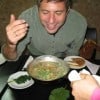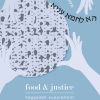by Dr. Jeremy Benstein, The Heschel Center, Tel Aviv This coming fall, November 2-7, 2011, the Heschel Center for Environmental Learning and Leadership, together with Hazon, will be hosting the second Israel Sustainable Food Tour. This exciting program is a unique way for North American Jews who are passionate about sustainable food to be exposed to the rapidly developing field of sustainable food in Israel. It is also an important opportunity for Israeli activists to meet likeminded counterparts and hear about their experiences, successes, challenges, insights and inspiration. Since Heschel’s original National Sustainable Food Conference a little over a year ago, which attracted 600 people with 40 roundtables and working groups, we have been working to create a coalition of people and organizations who are interested in promoting sustainable food in its myriad guises and contexts. We have been meeting with farmers, academics, government officials, health and nutrition experts, consumer policy groups, educators, nutritional security advocates and more to create the connections necessary to promote a shared agenda backed by leading stakeholders from all sectors. (more…)








